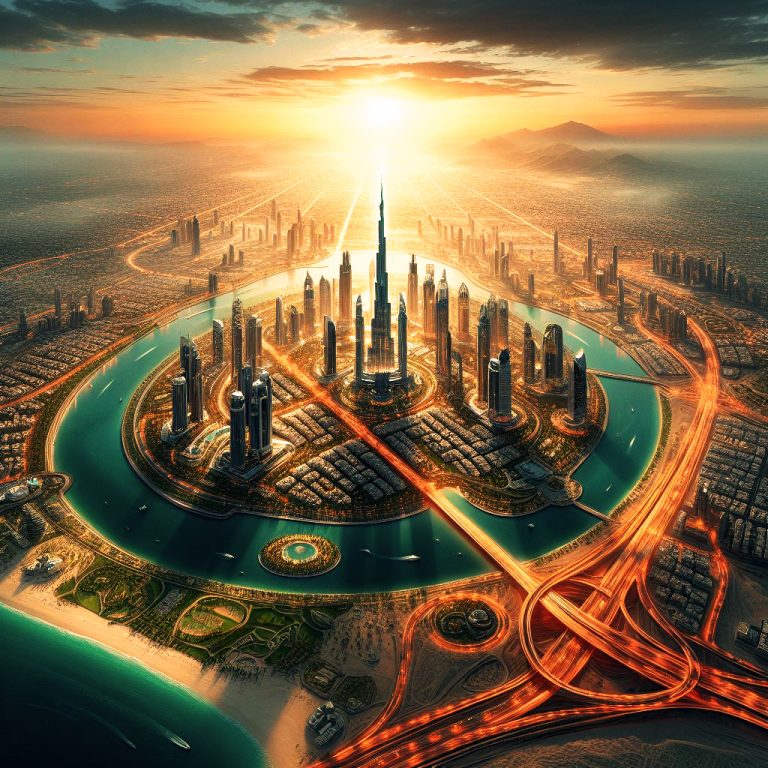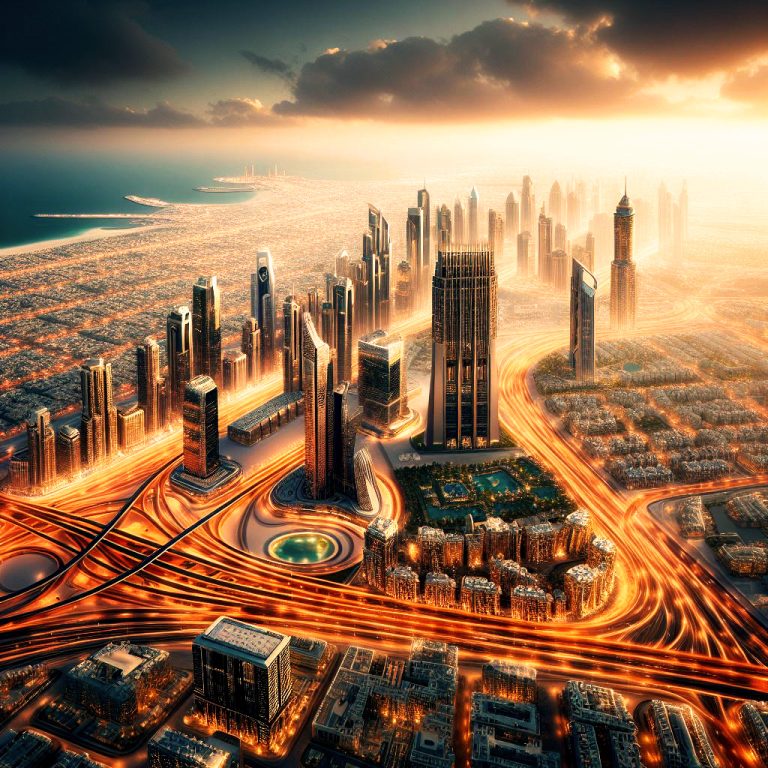Indian Investors Lead Dubai's Real Estate Market
Dubai’s real estate market has long been recognized for its vibrancy, attracting investors from around the world with its diverse property offerings. Among these investors, Indians have consistently ranked among the top three nationalities purchasing properties in Dubai for nearly two decades. In 2022, Indian buyers made real estate purchases worth over $4 billion in the city, and between 2015 and 2021, they acquired properties worth AED 84 billion.
The appeal for Indian investors lies in various factors, including high rental yields ranging from 5% to 7%, Dubai’s strategic location, business-friendly environment, stable political climate, quality of life, and robust economy. However, what may be less known is that Dubai’s real estate developers are now expanding their presence and investments in India’s thriving property market.
With India being one of the fastest-growing economies globally, there is a significant demand for new infrastructure and housing. The country’s young population, with an average age of 28, represents a large pool of potential property buyers. Additionally, India consistently introduces reforms to facilitate easier access for foreign investors and businesses, enhancing its appeal as a global business hub.

Jumeirah Group
One example of Dubai’s developers eyeing India’s market is the Jumeirah Group, a renowned luxury hotel company. They have set an ambitious goal to double their global footprint by 2030 and are actively exploring locations in India for luxury facilities. The company plans to expand from 27 to 54 properties over the next seven years. Through roadshows held in Delhi and Ahmedabad, the Jumeirah Group has shown its commitment to India. Linda Lewis, Vice President of Global Sales – Middle East, Africa, and Asia Pacific, stated their intent to create an “uber-luxury property” in the tier-one market of India. Kirti Anchan, General Manager of Jumeirah Emirates Towers and Jumeirah Living, emphasized that India is a market they cannot ignore.
This symbiotic relationship between Indian investors finding Dubai attractive and Dubai’s developers eyeing India’s growing economy reflects the dynamic and evolving nature of the global real estate landscape. It highlights the interconnectedness of international markets and the pursuit of opportunities in emerging economies.
Dubai's real estate sector
Dubai’s real estate developers are actively expanding their presence and investments in India’s flourishing property market. Dubai is well-known for its thriving real estate sector, offering a wide range of properties that attract investors from around the world. Indians have consistently been among the top three nationalities purchasing properties in Dubai for nearly two decades. In 2022, Indian buyers remained a dominant force in Dubai’s real estate market, with purchases amounting to over $4 billion. Between 2015 and 2021, Indian real estate investors acquired properties worth AED 84 billion in Dubai. The appeal for Indian investors lies in factors such as high rental yields ranging from 5% to 7%, Dubai’s strategic location, business-friendly environment, stable political climate, quality of life, and robust economy.
However, what may not be as widely recognized is that Dubai’s developers and builders are now looking to expand their businesses into India’s booming real estate sector. India ranks among the fastest-growing economies globally, creating a strong demand for new infrastructure and housing. With an average age of 28, India’s young population represents a significant pool of potential property buyers. Furthermore, India consistently introduces reforms to facilitate easier access for foreign investors and businesses, making it an attractive global business hub.
Goal
One notable example is the Jumeirah Group, a luxury hotel company, which has set its sights on India. Their goal is to double their global footprint by 2030, and they are actively exploring locations in India for luxury facilities. The company plans to expand from 27 to 54 properties over the next seven years. Demonstrating their commitment to India, they have conducted roadshows in Delhi and Ahmedabad. Linda Lewis, Vice President of Global Sales – Middle East, Africa, and Asia Pacific, emphasized their focus on the tier-one market and their aim to create an uber-luxury property in India. Kirti Anchan, General Manager of Jumeirah Emirates Towers and Jumeirah Living, stated that India is a market they cannot ignore. This synergy between Indian investors finding Dubai attractive and Dubai’s developers eyeing India’s growing economy showcases the dynamic and evolving nature of the global real estate landscape.
Dubai’s real estate developers are actively expanding their presence and investments in India’s thriving property market. Dubai is renowned for its robust real estate sector, offering a diverse range of properties that attract investors worldwide. For nearly two decades, Indian buyers have consistently ranked among the top three nationalities purchasing properties in Dubai. In 2022, Indian buyers continued to make a significant impact in Dubai’s real estate market, with purchases exceeding $4 billion. From 2015 to 2021, Indian real estate investors acquired properties worth AED 84 billion in Dubai. Indian investors are drawn to Dubai due to various factors, including high rental yields ranging from 5% to 7%, Dubai’s strategic location, business-friendly environment, stable political climate, quality of life, and strong economy.
Real estate sector
However, it may be less widely acknowledged that Dubai’s developers and builders are now seeking to expand their operations in India’s thriving real estate sector. India ranks among the fastest-growing economies globally, driving a substantial demand for new infrastructure and housing. With an average age of 28, India’s youthful population represents a significant pool of potential property buyers. Moreover, India consistently introduces reforms to facilitate easier access for foreign investors and businesses, enhancing its appeal as a global business hub.
A noteworthy example of this trend is the Jumeirah Group, a luxury hotel company, which has set its sights on India. Their ambitious goal is to double their global footprint by 2030, and they are actively exploring locations in India for luxury facilities. Over the next seven years, the company plans to expand from 27 to 54 properties. To showcase their commitment to India, they have conducted roadshows in Delhi and Ahmedabad. Linda Lewis, Vice President of Global Sales – Middle East, Africa, and Asia Pacific, emphasized their focus on the tier-one market and their aspiration to create an exceptional luxury property in India. Kirti Anchan, General Manager of Jumeirah Emirates Towers and Jumeirah Living, highlighted the significance of the Indian market, emphasizing that it cannot be overlooked. This symbiotic relationship between Indian investors finding Dubai appealing and Dubai’s developers eyeing India’s growing economy exemplifies the dynamic and evolving nature of the global real estate landscape.

Dubai's economy
Indian investment has had a significant impact on Dubai’s economy, particularly in the real estate sector. Indians consistently rank among the top three nationalities purchasing properties in Dubai, with over $4 billion worth of real estate purchases made by Indians in 2022 alone. Between 2015 and 2021, Indian investors acquired properties worth AED 84 billion, contributing to the growth and stability of Dubai’s real estate market.
Dubai’s attention has been drawn to India’s robust economy and business-friendly environment. As one of the fastest-growing economies globally, India presents a strong demand for new infrastructure and housing, making it an attractive market for Dubai’s developers and builders.
India’s young population, with an average age of 28, offers a demographic advantage for Dubai. This aligns with Dubai’s goal of attracting foreign investors and businesses, as the young population represents a significant pool of potential property buyers.
The luxury hotel company, Jumeirah Group, is actively expanding its presence in India as part of its goal to double its global footprint by 2030. They are exploring Indian locations for luxury facilities, reflecting the synergy between Indian investors finding Dubai appealing and Dubai’s developers eyeing India’s growing economy.
In summary
Indian investment has bolstered Dubai’s real estate sector, contributed to economic growth, and fostered cross-border business collaborations. This dynamic relationship between the two nations continues to shape the global real estate landscape.
Real estate market
Dubai’s real estate market, known for its remarkable growth and iconic developments, has faced several challenges in recent years. It is essential for investors and potential buyers to understand these challenges to make informed decisions in this dynamic market.
Let’s delve into some of the major challenges faced by Dubai’s real estate sector:
- Market Volatility: Property values in Dubai can change and fluctuate over time, influenced by factors such as changes in the economy, global events, and shifts in supply and demand. It’s crucial to be aware of the unpredictability of property values when investing in Dubai’s real estate market. Diversifying investments across different properties or real estate sectors can help mitigate risks, and staying updated on economic trends is crucial.
- Regulatory Changes: Dubai’s real estate market is subject to evolving regulations and policies. It’s important to stay informed about these changes as they can impact investors. While regulations aim to safeguard the sector and increase transparency, they can also present challenges. Staying updated on regulatory updates ensures effective navigation of the market.
- Supply and Demand Dynamics: Balancing supply and demand is crucial for any real estate market. Dubai has witnessed rapid development, resulting in an increase in supply. However, aligning this supply with actual demand remains a challenge. Oversupply can impact property prices and rental yields, requiring careful assessment of market dynamics.
- Affordability Concerns: Dubai’s real estate can be expensive, posing challenges for both buyers and renters. Striking a balance between quality properties and affordability is essential for sustainable growth in the market.
- Global Economic Factors: Dubai’s real estate market is influenced by global economic conditions. Economic downturns, geopolitical tensions, and changes in investor sentiment can impact property values. Being aware of global economic trends is crucial for navigating the market effectively.
In the face of these challenges, working with local experts who have deep knowledge of Dubai’s real estate market can provide valuable insights and strategies. Despite the hurdles, Dubai continues to attract investors due to its strategic location, architectural marvels, and the unique blend of traditional and modern living it offers.
The impact of Indian investment
The impact of Indian investment on Dubai’s economy has been highly significant, particularly in the real estate sector. Indian buyers consistently rank among the top three nationalities purchasing properties in Dubai, with real estate purchases worth over $4 billion made by Indians in the city in 2022 alone. From 2015 to 2021, Indian investors acquired properties worth AED 84 billion, resulting in substantial growth and stability for Dubai’s real estate sector.
Dubai has been attracted to India’s robust economy and business-friendly environment. With India ranking among the fastest-growing economies globally, there is a strong demand for new infrastructure and housing. As a result, Dubai’s developers and builders are actively exploring opportunities in India’s booming real estate market.
The young population of India
The young population of India, with an average age of 28, represents a significant demographic advantage for Dubai. This aligns with Dubai’s objective of attracting foreign investors and businesses, as the young population presents a large pool of potential property buyers.
Jumeirah Group, a luxury hotel company, has set a goal to double its global footprint by 2030. They are currently exploring Indian locations for luxury facilities. This commitment to India reflects the synergy between Indian investors finding Dubai attractive and Dubai’s developers eyeing India’s growing economy.
In summary
Indian investment has not only bolstered Dubai’s real estate sector but also contributed to economic growth and fostered cross-border business collaborations. The dynamic relationship between these two nations continues to shape the global real estate landscape.
Dubai’s economy, driven by substantial real estate investment, has experienced both growth and challenges. Let’s explore the impact:
-Economic growth: Dubai’s real estate sector has been a major contributor to economic expansion. Foreign investment, including significant capital from India, has stimulated construction, infrastructure development, and job creation. The emergence of iconic skyscrapers, luxury residences, and commercial spaces enhances Dubai’s global reputation, attracting businesses, tourists, and investors.
-Diversification efforts: While real estate remains a cornerstone, Dubai has actively diversified its economy. Sectors such as tourism, finance, logistics, and technology have gained prominence. The Dubai Expo 2020, held after a year’s delay, showcased innovation, sustainability, and cultural exchange. These efforts aim to reduce dependence on oil revenues and create a resilient, knowledge-based economy.
-Challenges: Despite growth, Dubai faces challenges. Oversupply in the real estate market has led to fluctuations in property values. Regulatory changes, geopolitical tensions, and global economic shifts can impact investor confidence. Balancing affordability with quality remains crucial. Additionally, the pandemic’s disruption to travel and tourism has affected the hospitality and retail sectors.
-Future prospects: Dubai’s strategic location, connectivity, and business-friendly policies position it for continued growth. The city’s commitment to sustainability, innovation, and smart infrastructure bodes well for long-term prosperity. As the real estate market evolves, diversification and adaptability will shape Dubai’s economic trajectory.
In summary, Dubai’s economy, influenced by real estate investment and broader initiatives, is navigating challenges while striving for resilience and sustainable development.

Why You Need an Accountant for Financial Success?
Are you considering starting a business in Dubai? Embarking on a new business venture can be overwhelming, especially when it comes to managing your finances. Without the necessary knowledge and tools, the chances of achieving success are significantly diminished. That’s why having an accountant for your business start-up in Dubai is crucial – their expertise can ensure that your finances are well-managed and your business thrives. In this article, we will explore the reasons why you need an accountant to guide you on your business start-up journey.
While many individuals venture into business because they possess entrepreneurial acumen and recognize promising opportunities, they may not necessarily be experts in the legal and financial aspects of running a business. This is where hiring the services of reputable chartered accountants in Dubai, UAE, or Cairo, Egypt, and the Middle East becomes essential. The prospect of making such considerations can seem daunting, but with our comprehensive advice and support, you can proceed with confidence and concentrate on establishing a successful venture.
At AHG, our company can assist you in establishing your company or investment by providing integrated and specialized services that ensure project success and goal achievement. Contacting us is an essential step toward attaining business success.

